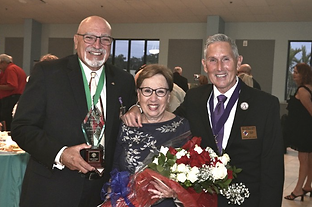Latest Council News
Stay informed as we share our Council Newsletter, as well as recognize our Knight of the Month/Year and Family of the Month/Year for their outstanding service. Check back often to see how we’re making a difference in our parish, community, and beyond.
Family of the Year (2025)

Jerry and Joann Graceffo
Knight of the Year (2025)

Mike Gonzales

Tom and Sharon Ricketts, December 2025

Patrick George, December 2025
Previous Family of the Month
Bill and Connie Rempe November 2025
Mike & Janice Novello, October 2025
Ernie and Terri Soller September 2025
Dave & Marge Reich, August 2025
Tod & Patty Taylor, July 2025
Mike & Nadine Kulikowski, May 2025
Rich & Debbie Kent, April 2025
Kent & Patty Goodger, March 2025
Mike & Maureen Kelley, February 2025
Tom & Lori Ludwig, January 2025
Al & Ana Tagliaferro, December 2024
Paul & Barb Petrus, October 2024
Dennis & Franci Beville, September 2024
Rick & Lauren Kuebel, August 2024
Joe & Barbara Pfeiffer, July 2024
Previous Knight of the Month
Mike Marciuliano, November 2025
Fr. Sebastian Szczawinski, October 2025
Keith Dunlap and Bob Soper September 2025
Sam Russell, August 2025
David Lawson, July 2025
Rich McBride, May 2025
Joe Finamore, April 2025
Joe Timmons, March 2025
Jim Thompson, February 2025
Joe Mascari, January 2025
Paul Pless, December 2024
Randy Knowles, October 2024
Mike Sassano, September 2025
Phil G/Keith Green, August 2025
Clem Presogna, July 2025
Council Newsletters
December 2025 Council Newsletter
November 2025 Council Newsletter
October 2025 Council Newsletter
September 2025 Council Newsletter
August 2025 Council Newsletter
June 2025 Council Newsletter
March 2025 Council Newsletter
February 2025 Council Newsletter
January 2025 Council Newsletter
December 2024 Council Newsletter
November 2024 Council Newsletter
October 2024 Council Newsletter
